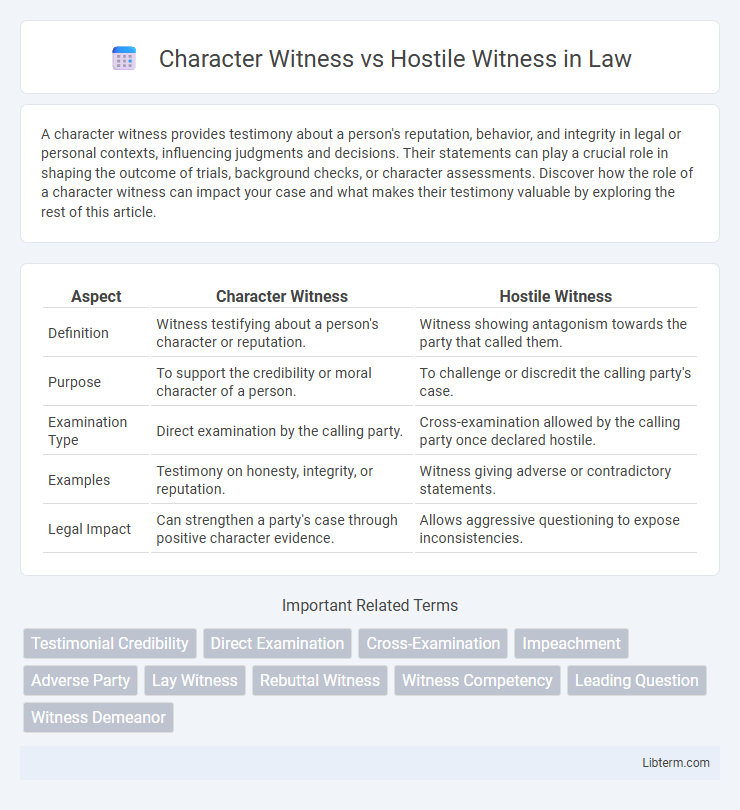A character witness provides testimony about a person's reputation, behavior, and integrity in legal or personal contexts, influencing judgments and decisions. Their statements can play a crucial role in shaping the outcome of trials, background checks, or character assessments. Discover how the role of a character witness can impact your case and what makes their testimony valuable by exploring the rest of this article.
Table of Comparison
| Aspect | Character Witness | Hostile Witness |
|---|---|---|
| Definition | Witness testifying about a person's character or reputation. | Witness showing antagonism towards the party that called them. |
| Purpose | To support the credibility or moral character of a person. | To challenge or discredit the calling party's case. |
| Examination Type | Direct examination by the calling party. | Cross-examination allowed by the calling party once declared hostile. |
| Examples | Testimony on honesty, integrity, or reputation. | Witness giving adverse or contradictory statements. |
| Legal Impact | Can strengthen a party's case through positive character evidence. | Allows aggressive questioning to expose inconsistencies. |
Understanding Character Witnesses
Character witnesses provide testimony about a person's reputation, habits, and moral qualities to establish their credibility or trustworthiness in legal proceedings. Their statements often influence the jury's perception by highlighting positive traits relevant to the case, such as honesty or peacefulness. Understanding character witnesses requires recognizing their role in supporting or defending a party's integrity, contrasting with hostile witnesses whose testimony may undermine or challenge that party.
Defining Hostile Witnesses
A hostile witness is a person called to testify who demonstrates antagonism or unwillingness to provide truthful or favorable evidence, often contradicting the party that called them. Unlike a character witness who offers positive testimony about someone's traits or reputation, a hostile witness may be cross-examined by the calling party to challenge their credibility. Courts recognize hostile witnesses to allow parties to treat testimony as adversarial, enabling more rigorous questioning and impeachment.
Key Differences Between Character and Hostile Witnesses
A character witness provides testimony about a person's reputation, personality, or behavior to support their credibility or moral character during a trial, often offering positive insights based on personal knowledge or observations. A hostile witness, by contrast, is a witness who shows opposition or unwillingness to cooperate with the party that called them, allowing the calling attorney to cross-examine them like an adverse party to challenge their testimony. The key differences lie in the purpose and treatment of the witnesses: character witnesses are generally friendly and affirming, while hostile witnesses require rigorous cross-examination to expose inconsistencies or bias.
Legal Roles in Court Proceedings
A character witness provides testimony that attests to a defendant's reputation or moral character, often influencing the jury's perception of credibility and trustworthiness. A hostile witness, typically a witness called by the opposing party, is uncooperative or adverse, and the attorney may use leading questions during direct examination to challenge their statements. Understanding the distinct legal roles of character and hostile witnesses is crucial for effective courtroom strategy and the administration of justice.
Admissibility of Testimony
Testimony from a character witness is generally admissible to establish a party's reputation or traits relevant to the case, provided it complies with rules on relevance and reliability, specifically under Federal Rules of Evidence 404 and 405. In contrast, testimony from a hostile witness may be subject to cross-examination, and their earlier statements can be used for impeachment, but courts carefully scrutinize the admissibility of their testimony to prevent undue prejudice or confusion. The key distinction lies in the scope and purpose of testimony, influencing evidentiary rulings on its admissibility during trial.
Impact on Jury Perception
A Character Witness often bolsters jury perception by providing favorable testimony about a party's trustworthiness or moral character, enhancing credibility and eliciting empathy. In contrast, a Hostile Witness may undermine the opposing party's case due to aggressive or evasive responses, leading the jury to question the reliability of their testimony. The distinct roles of these witnesses significantly sway jury interpretation, influencing verdict direction and case outcomes.
Examination and Cross-Examination Techniques
Character witnesses are examined using direct examination techniques that emphasize eliciting positive traits and credibility through open-ended questions allowing the witness to provide detailed affirmations. Cross-examination of character witnesses focuses on challenging the consistency and reliability of their testimony by introducing contradictions or evidence that undermines the witness's portrayal. Hostile witnesses require leading questions during direct examination to control and limit their adverse testimony, while cross-examination aims to exploit inconsistencies and direct admissions to weaken the opposing party's case.
Challenges in Handling Witness Testimonies
Handling character witnesses poses challenges in maintaining credibility and avoiding bias, as their testimony often aims to influence the jury's perception of a party's traits rather than facts. In contrast, managing a hostile witness requires skillful cross-examination to limit damaging admissions and control the narrative despite their adversarial stance. Effective strategies must balance eliciting truthful information while mitigating risks of inconsistent or prejudiced statements that can undermine the case.
Legal Strategies for Dealing with Hostile Witnesses
Legal strategies for dealing with hostile witnesses involve thorough preparation and precise courtroom techniques to undermine the witness's credibility while strengthening the case. Attorneys employ focused cross-examination to expose inconsistencies and bias, often using leading questions to control testimony. Employing motions to compel truthful answers or impeach the witness with prior statements enhances the ability to challenge hostile testimony effectively.
Importance of Witness Credibility
Character witnesses provide testimony that supports a party's reputation, influencing the jury's perception of reliability and truthfulness, whereas hostile witnesses exhibit opposition or reluctance, often undermining their own credibility. The importance of witness credibility lies in its capacity to sway verdicts, as juries and judges rely heavily on consistent, trustworthy accounts to determine factual accuracy. Establishing or challenging credibility through cross-examination, demeanor observation, and corroborative evidence is crucial to the outcome of legal proceedings.
Character Witness Infographic

 libterm.com
libterm.com